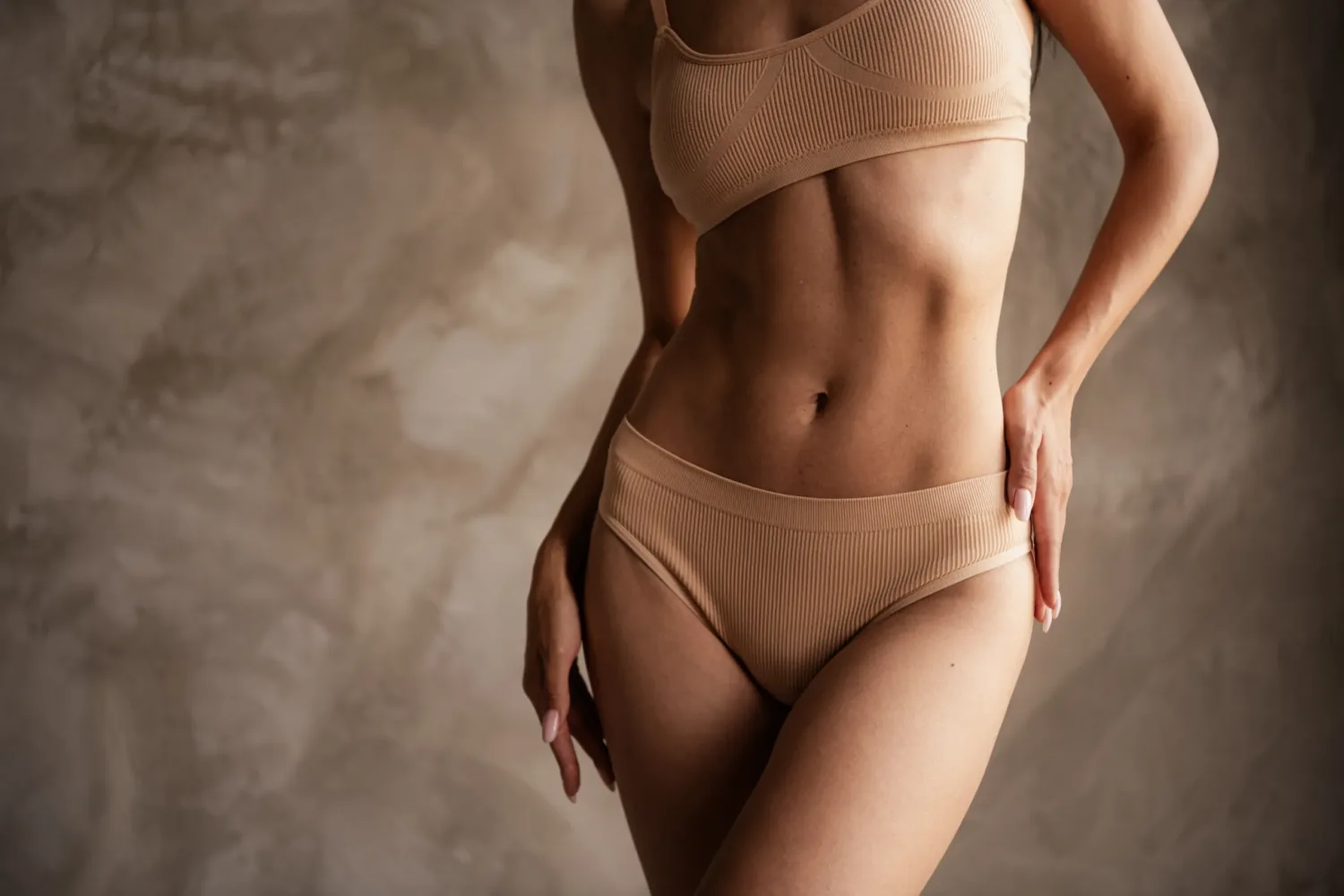According to the Cambridge Dictionary, confidence is defined as “the quality of being certain of your abilities or of having trust in people, plans, or the future.” [1] Confidence is a feeling that can fluctuate from day to day, or even hour to hour, and everyone experiences it differently.
Physical confidence, or how confident we feel in the way we look, can also vary depending on factors such as age, health, lifestyle, and relationship status. External influences can have a significant impact on how we feel about ourselves and our overall confidence levels.
To explore when people feel most physically confident, we surveyed 1,032 UK adults about their confidence at different stages of life, as well as the reasons behind the highs and lows.
Key findings:
- On average Brits feel most confident with their physical appearance at age 31.
- Most people are not currently at their peak in body confidence (63.8%).
- The body parts participants currently felt most confident about include their skin (3.4 out of 5), hair (3.3 out of 5, rated equally by both men and women), and legs (3.3).
- On the other hand, Brits report lower levels of confidence with their stomach or abdomen area (2.8 out of 5) and waist (3.0).
- Over a quarter of men (26.6%) rated their hair just 1 or 2 out of 5, with dissatisfaction highest among those aged 61-65 (33.3%), followed by 56-60 (32.4%) and 18-24 (31.9%).
- Research shows body confidence tends to rise with household income, peaking at an average rating of 4.3/5 for those earning £150,000–£174,999, and lowest at 2.9/5 for those earning under £10,000–£24,999.
- Wearing flattering clothes (44.3%), committing to regular exercise (42.8%) and weight loss (39.5%) were shown to boost confidence the most.
- For almost half (48.9%), weight gain was the most common reason their confidence has been knocked.
- Almost a third of women who have children (31.8%) said pregnancy or postpartum body changes knocked their body confidence.
What age do Brits feel most confident in their physical appearance?
When asked when they felt most confident in their physical appearance, 24% said this was between the ages of 18-24, 23.4% between 25-30 and 14.5% between 31 to 35.
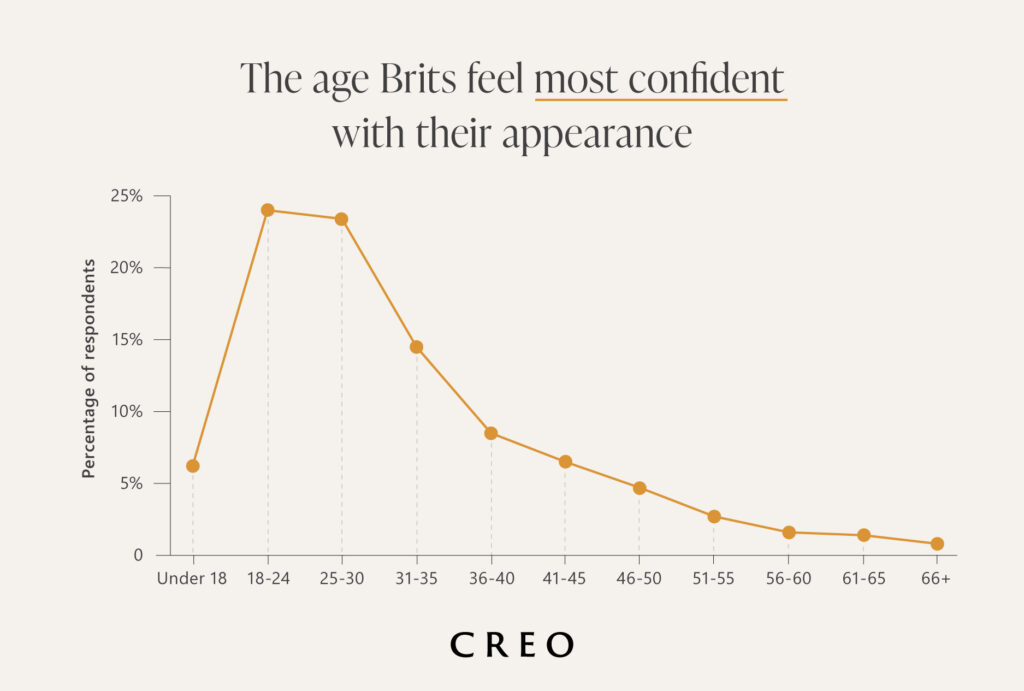
However, across all participants, the average age at which people felt confident in their physical appearance was 31. For men, this average age for peak body image confidence is 32 and for women is 31.
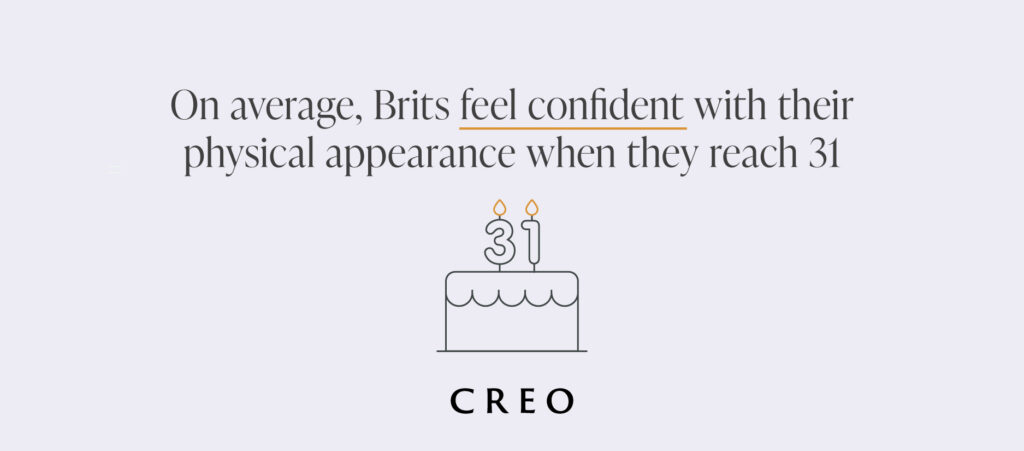
Women were more likely than men to identify their teenage years as a period of confidence (6.7% of women said they felt most confident under 18 compared to 5.9% of men).
5.7% of respondents admitted that they believe they have never felt physically confident in their appearance. Of this group, the average age at which they had never felt confident was 46. More women (6.9%) than men (4.5%) said they never felt confident.
Life begins again at 50: Confidence dips in the 30s but climbs again in midlife
As part of the research, we isolated and grouped the answers from participants over 50 to determine how confidence develops over a lifetime.
From this, we can see that confidence levels fluctuate, with high levels of confidence during the 20s and early 30s followed by a decline before rising again from mid-40s and into the 50s.
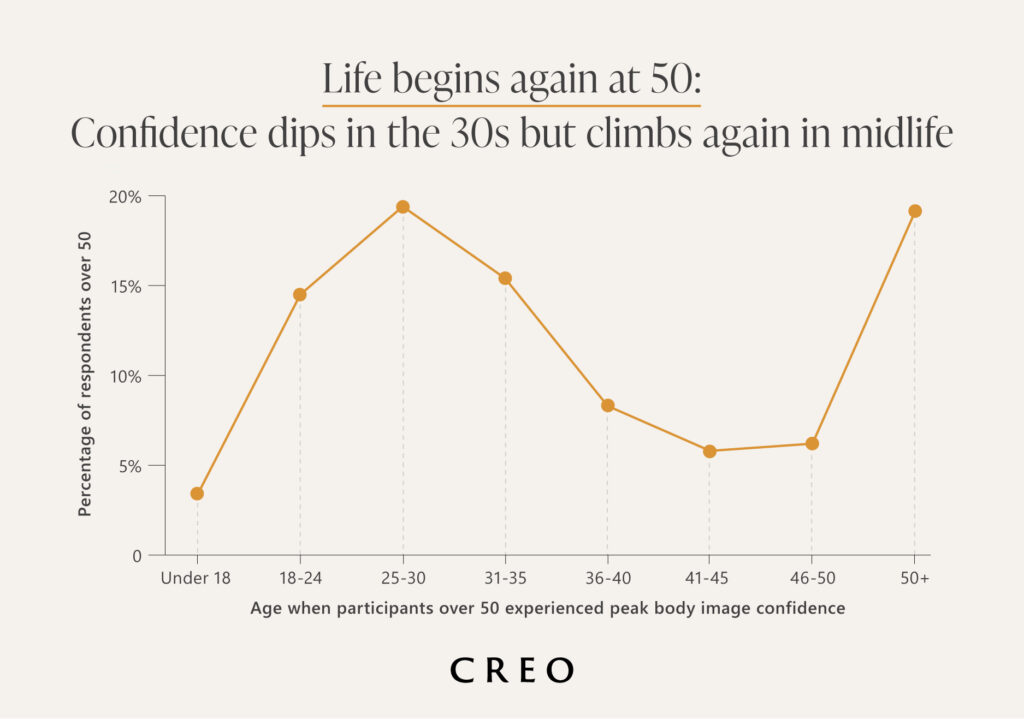
*Isolated and grouped answers from participants aged over 50
The 30s can be a particularly demanding stage of life. In England and Wales, the 2021 Census shows that the average age of mothers is 31 (not just first-time mothers), while for fathers it is 34. Likewise, in 2020 the median age at first marriage was 32 for men and 30 for women in opposite-sex marriages. Financial pressures also weigh heavily, with more than half of people owning their own home by the age of 36. [2] With so many major milestones and responsibilities converging in this decade, it’s perhaps no surprise that participants reported a dip in physical confidence during their 30s.
On the other hand, our research shows an increase in confidence levels from the ages of 41-45. According to data from Census, in 2023 people aged 47 in England and Wales had the highest average wage. [2] This study later explores the correlation between body image and financial confidence.
Peak body image confidence: Men vs women
The average age for peak confidence between men and women is very similar: 31 for women and 32 for men.
A quarter (25%) of male participants said they felt most confident at 18-24. In comparison, 23.1% of women selected this age group as their most confident. Following this, 23.8% of men said they felt most confident at 25-30 and 13.8% at 31-35. On the other hand, 23% of women said their peak confidence came at 25-30 and 15.2% at 31-35.
Men were also more likely to feel slightly more confident later in life. 18.5% of male participants reported feeling most confident between the ages of 41 and over 66. Whereas just 16.7% of women agreed.
However, the least confident age group for men and women was 66+ (0.4% of women and 1.2% of men chose this age range).
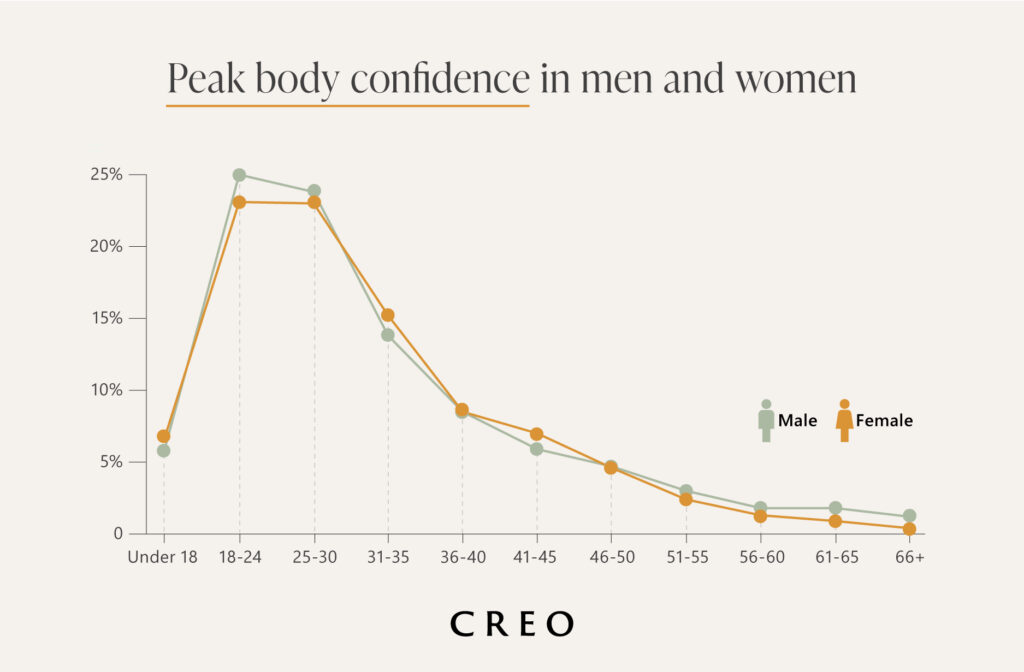
What drives physical confidence?
We also asked participants what factors contributed to their peak physical confidence. The most common reason, cited by 60.3%, was being fit and healthy, highlighting a clear link between how we look and how we feel.
Weight also played a key role, with 46.5% saying they felt most confident when they were at a weight they were happy with. Rounding out the top three, 37.1% of participants attributed their confidence to the way they presented themselves, particularly dressing in a way that made them feel good.
| The reasons why Brits feel physically confident | ||
|---|---|---|
| Rank | Reason* | Percentage of respondents |
| 1 | I felt fit and healthy | 60.3% |
| 2 | I was at a weight I was happy with | 46.5% |
| 3 | I dressed in a way that made me feel good | 37.1% |
| 4 | I felt attractive to others | 34.9% |
| 5 | I was in a positive mental state | 31.6% |
| 6 | I received compliments | 30.9% |
| 7 | I had a consistent exercise routine | 22.3% |
| 8 | I was in a stable and happy relationship | 21.1% |
| 9 | I had clear skin | 19.9% |
| 10 | I had time to prioritise self-care | 17.4% |
| 11 | I wasn’t concerned about my appearance | 16.8% |
*Respondents could select more than one answer.
Interestingly, the least common reason for peak confidence, chosen by just 16.8%, was simply not worrying about appearance. Of those who gave this reason, 53.8% were women and 46.2% were men. This reason was most often cited by people who felt most confident at a younger age, with 23.1% of those recalling their peak confidence between 18-24 saying they did not care about their appearance, followed by 20.2% of those who felt most confident at 25-30.
Brits are more socially active when they feel most confident about their appearance (46.1%)
The survey asked participants how they behaved differently when they were feeling most confident in their appearance.
Almost half of respondents (46.1%) said they were more socially active when they felt most confident in their appearance. A further 44.6% reported being more physically active, 33.5% were more willing to be in photos, and 32.4% said they were more outgoing in social situations. In terms of personal presentation, 31.7% said they took greater care with their appearance when confident. In contrast, of those who said they were not concerned about their appearance at the time they felt most confident, only 3.6% reported also taking extra care with how they looked.
These findings suggest that body confidence often translates into more active and engaged behaviour, both socially and physically. The connection with physical activity is particularly significant, as greater confidence appears to encourage people to exercise more, pointing to a link between self-image and health. Confidence also seems to drive greater attention to grooming, clothing choices and overall personal care, as people aim to align how they look with how they feel.
| How behaviour changes when Brits feel most physically confident | ||
|---|---|---|
| Rank | How their behaviour changed* | Percentage of respondents |
| 1 | I was more socially active | 46.1% |
| 2 | I was more physically active | 44.6% |
| 3 | I was more willing to be in photos | 33.5% |
| 4 | I was more outgoing in social situations | 32.4% |
| 5 | I took more care with my appearance | 31.7% |
| 6 | I dressed more boldly or stylishly | 26.7% |
| 7 | I cared less about others’ opinions | 26.5% |
| 8 | I engaged more in romantic relationships | 20.4% |
*Respondents could select more than one answer.
How confident do Brits currently feel about their physical appearance?
To get a sense of how people feel about their bodies today, we asked respondents to rate their confidence in different areas on a scale from one to five, with one meaning “not at all confident” and five meaning “extremely confident.”
On average, Brits were most confident about their skin (3.4), calves (3.3), hair (3.3), neck (3.3), legs (3.3) and arms (3.3). Overall, Brits currently rate their body 3.2 out of five. On the other hand, on average over a quarter (26.6%) rated their body confidence just one or two out of five.
| Average body parts rating | |
|---|---|
| Body part | Average rating out of five |
| Skin | 3.4 |
| Calves | 3.3 |
| Hair | 3.3 |
| Neck | 3.3 |
| Legs | 3.3 |
| Arms | 3.3 |
| Chest/breast | 3.2 |
| Hips | 3.2 |
| Thighs | 3.2 |
| Buttocks | 3.2 |
| Overall body shape | 3.2 |
| Face | 3.2 |
| Waist | 3.0 |
| Stomach/abdomen | 2.8 |
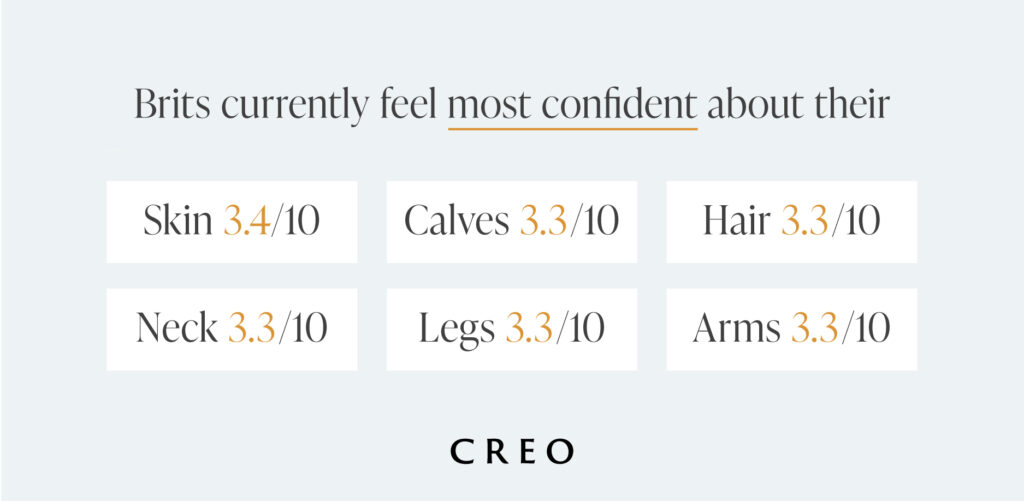
Hair was rated 3.3 out of five and was also rated evenly for men and women (both genders rating it just 3.3). However, over a quarter (26.6%) of men rated their hair just one or two out of five. The highest level of dissatisfaction from men came from those aged 61-65 (33.3%), followed by 56-60 (32.4%) and 18-24 (31.9%). While hair loss can affect men at any age, it’s reported that around 20% of men aged 20 have noticeable hair loss, followed by 25% of men aged 30 and 50% of men aged 50. [3]
This aligns with broader trends in the UK, where around 6.5 million men experience hair loss, highlighting that hair remains a significant factor in body image and self-perception for many men. [4] If we estimate the UK’s population of men over 18 to be around 25.5 to 27.4 million, we can predict that around 23-25% of this group are experiencing hair loss.
Brits show most dissatisfaction for their stomach
The areas that Brits were least confident about were their stomach or abdomen area (2.8) and waist (3.0). Alongside this, over a quarter (28%) rated their buttocks just one or two out of five, and a further 28.8% said the same for their thighs. Among those who rated their buttocks just one or two out of five, 67.1% were women, compared to 32.9% of men.
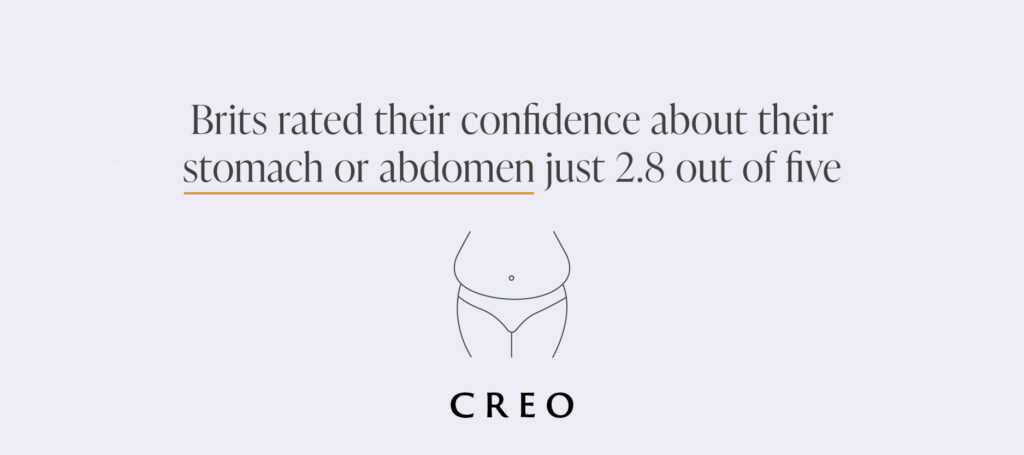
With the growing popularity of procedures like the Brazilian Butt Lift, it is perhaps unsurprising that such trends are reflected in confidence levels. Between 2015 and 2019, the number of BBL augmentation surgeries increased by 90.3%, reflecting how people are increasingly focused on enhancing this area of their body. [5]
Dr Omar Tillo comments,
“Given that the stomach area emerges as the primary concern for Brits, it’s no surprise that Liposuction and Tummy Tuck procedures have surged in popularity. [6] “Interestingly, despite globally trending procedures like Brazilian Butt Lifts (BBL) and Fat Transfers experiencing increases of 19% and 5% respectively between 2023 and 2024, [6] this growth pattern didn’t correlate with Brits having low confidence levels with their buttock. Our data shows that Brits reported relatively average confidence levels with their buttocks area, suggesting the global BBL trend may not be driven by the same concerns that motivate other cosmetic procedures.”
Higher earnings boost overall body confidence
Respondents were categorised by household income levels to determine how current body confidence varies between income brackets.
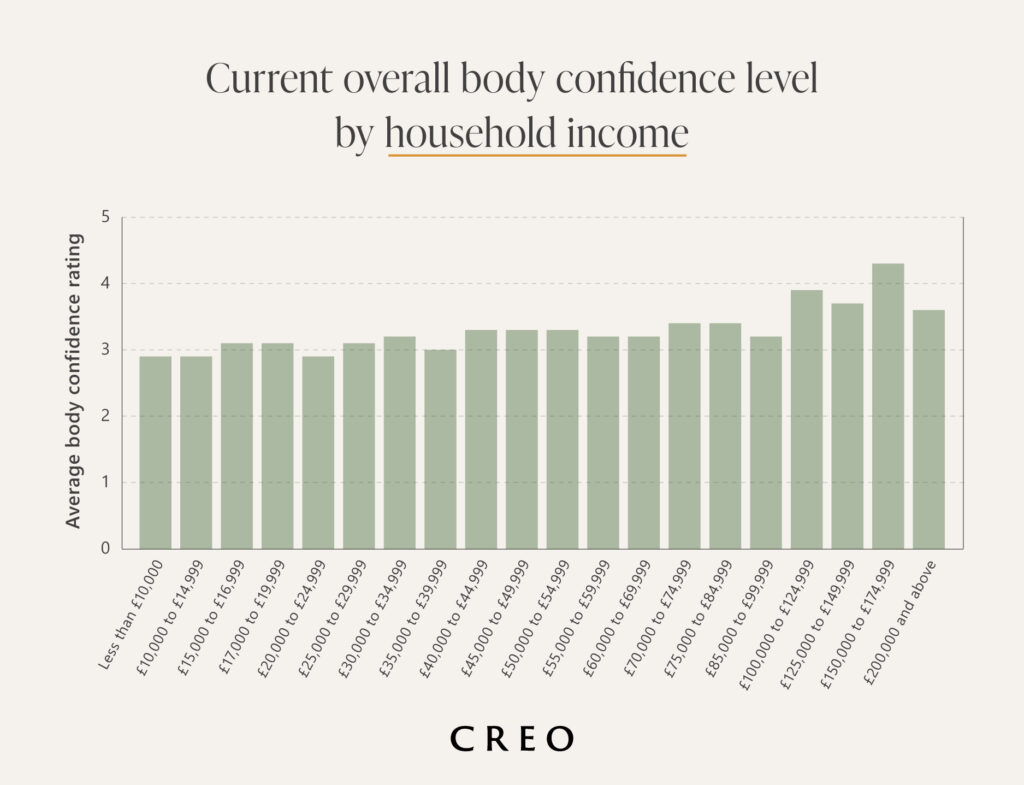
Overall, the research shows an upward trend, with higher household income brackets reporting slightly higher body confidence levels. Those who earn between £150,000 and £174,999 show the highest overall confidence levels, rating their bodies on average 4.3 out of five.
On the other hand, the lowest confidence levels are reported among those with household income brackets of less than £10,000 to £24,999, with an average body rating of 2.9.
What are the top confidence boosters?
As part of the research, we asked participants about the everyday habits and achievements that have boosted their confidence the most, from committing to skincare routines and wearing flattering clothes to reaching fitness goals.
Wearing flattering clothes is the top confidence booster among Brits (44.3%)
The most popular confidence booster was wearing clothes that flatter their bodies, agreed by 44.3% of respondents. This was followed closely by committing to regular exercise (42.8%) and achieving weight loss (39.5%).
| Things that have boosted confidence the most | ||
|---|---|---|
| Rank | Confidence booster* | Percentage of respondents |
| 1 | Wearing clothes that suit my body | 44.3% |
| 2 | Committing to regular exercise | 42.8% |
| 3 | Weight loss | 39.5% |
| 4 | Getting compliments from others | 33.9% |
| 5 | Feeling attractive to a partner or romantic attention | 32.8% |
| 6 | Accepting my body and the way I look | 30.7% |
| 7 | Committing to a skincare routine | 24.7% |
| 8 | Committing to a haircare routine | 18.1% |
| 9 | Achieving a fitness goal (e.g. running a marathon) | 14.1% |
| 10 | Weight gain | 10.8% |
*Respondents could select more than one answer.
Women were significantly more likely than men to say weight loss boosted their confidence (66.4% versus 33.6%). Likewise, women were more likely to agree that wearing clothes that suited their body was a confidence booster (61.3% versus 38.7% of men).
For respondents who said that committing to a skincare routing had boosted their confidence, over half (52.5%) also currently rated their skin highly, scoring 4 or 5 out of five. According to the Value of Beauty Report from the British Beauty Council, the beauty industry grew by 11% in 2023, with sales reaching £27.2 billion. [7] This suggests that more people are spending money on skincare products and treatments to improve their skin quality and appearance.
What knocks confidence the most?
On the other hand, we also asked Brits to reveal what had knocked their confidence the most throughout their lives. For many, the top reason was gaining weight (48.9%).
Following weight gain, ageing (39.7%), stress or poor mental health (29.6%) and injury or illness (21.6%) were the top causes for a decrease in confidence levels.
| Things that have knocked confidence the most | ||
|---|---|---|
| Rank | Confidence knocker* | Percentage of respondents |
| 1 | Weight gain | 48.9% |
| 2 | Ageing or physical changes with age | 39.7% |
| 3 | Stress or poor mental health | 29.6% |
| 4 | Injury or illness | 21.6% |
| 5 | Skin issues | 21.4% |
| 6 | Lack of time for self-care | 17.6% |
| 7 | Struggling with clothing that fits or flatters | 15.9% |
| 8 | Hormonal changes (e.g. menopause) | 15.2% |
| =9 | Bullying | 14.1% |
| =9 | A relationship break up | 14.1% |
*Respondents could select more than one answer.
While women were more likely to say weight loss boosted their confidence (66.4%), this gender was also more likely to say that weight gain knocked their confidence (61.6% versus 38.4% of men).
Among women who have children, 31.8% said pregnancy or postpartum body changes had knocked their body image confidence. Alongside this, women were far more likely to have had their confidence knocked due to hormonal changes (79.6% versus 20.4% of men).
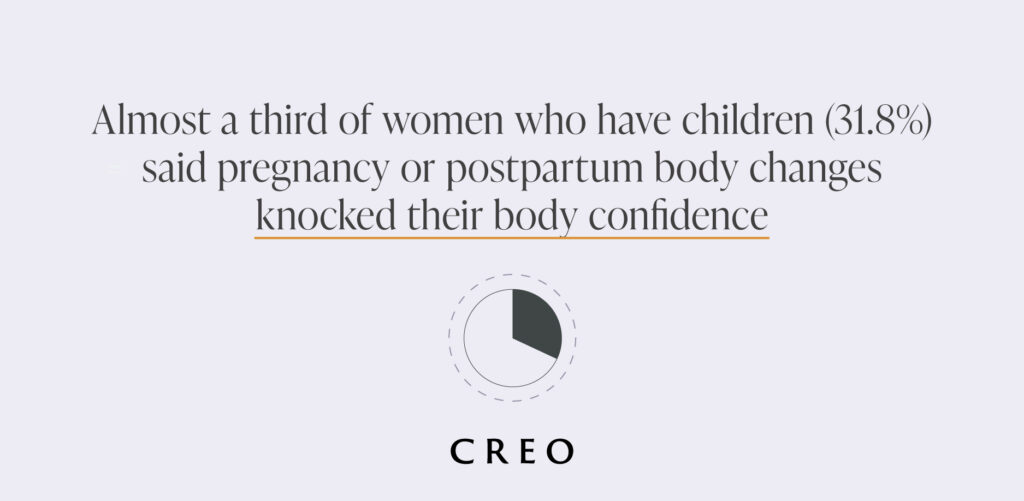
Less common concerns include comparing themselves to others on social media (11.5%) and weight loss (7.7%).
How does body image confidence affect other forms of confidence?
We asked participants to rate their confidence levels in other aspects of their life during their time of peak body image confidence. They were asked to rate the following on a scale of one to five, where one represented not being confident at all and five being extremely confident.
At the peak of their body image confidence, participants reported feeling more assured across multiple areas of life, particularly physically, mentally, socially, professionally and in relationships, though financial confidence remains lower.
| How do Brits rate other forms of confidence? | |
|---|---|
| Type of confidence | Average rating during peak body image confidence (out of five) |
| Mental or emotional confidence | 3.6/ 5 |
| Social confidence | 3.6/ 5 |
| Physical ability confidence | 3.5/ 5 |
| Professional or academic confidence | 3.5/ 5 |
| Romantic or relationship confidence | 3.5/ 5 |
| Financial confidence | 3.3/ 5 |
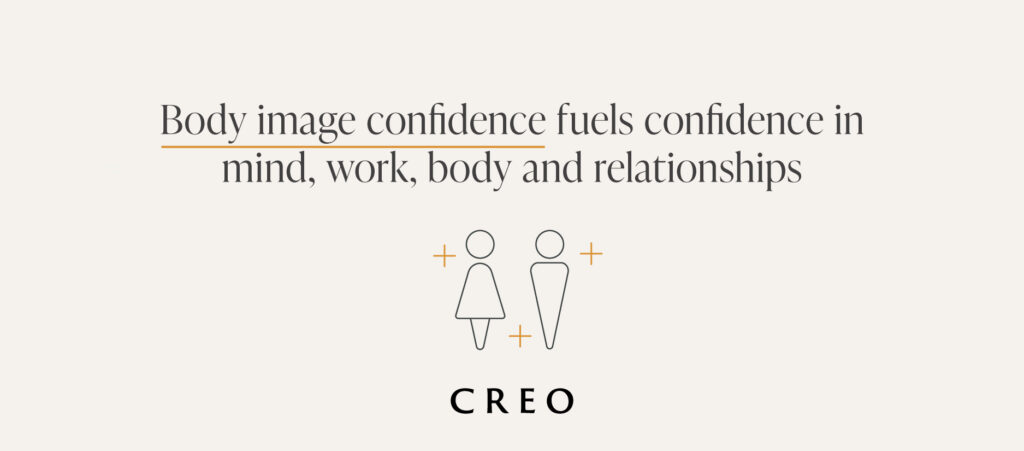
Physical ability confidence
When it comes to their physical ability (i.e. strength and fitness), there is a clear correlation between looking good and feeling good. At their peak body image confidence, most participants (37.8%) rated their physical ability a four out of five, while nearly a third (32.0%) gave themselves a three out of five.
Only 16.5% rated their physical ability a full five out of five, representing those who felt the most physically confident.
Mental or emotional confidence
Among the different types of confidence, mental or emotional confidence had the highest proportion of top scores, with 22.4% rating it five out of five. However, this form of confidence also shows volatility, as 6.1%, the second-highest proportion across all ratings, gave it just one out of five. Overall, most respondents (36.7%) rated it four out of five.
Interestingly, the data shows a strong trend between those who had high levels of physical and mental confidence during their period of peak body image confidence. For instance, among those who rated their mental state as five, around 78% also rated their physical state as four or five, showing that peak mental confidence coincides with strong physical well-being.
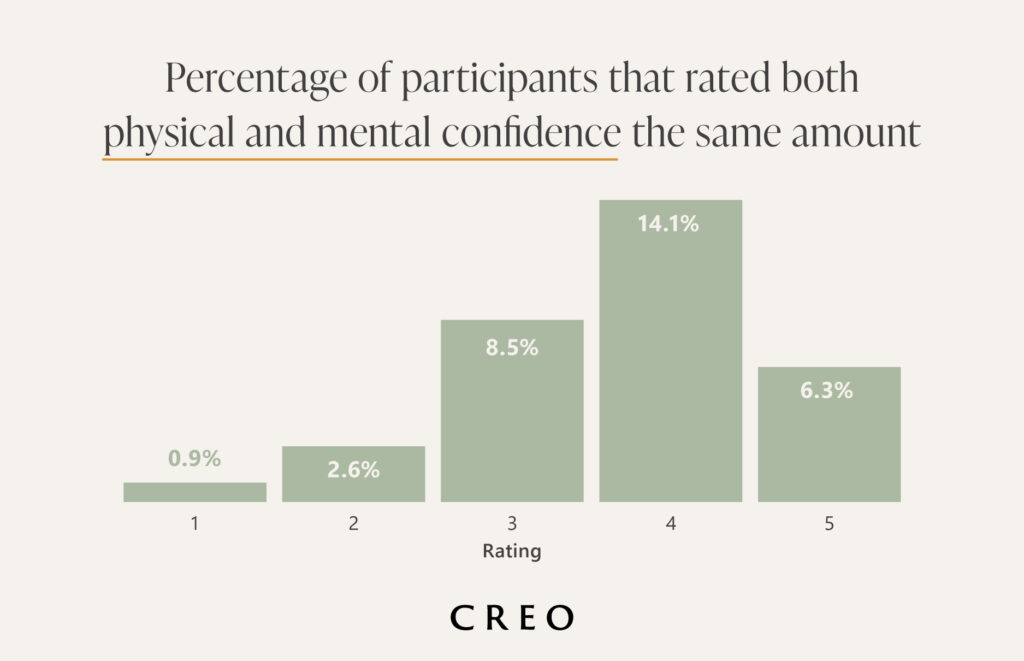
This pattern highlights the relationship between how people feel mentally and physically, with higher mental well-being accompanying higher physical activity or fitness, and vice versa.
Social confidence
Since 46.1% of respondents reported being more outgoing in social settings and with peers when they felt most confident in their physical appearance, this suggests an association between body confidence and social engagement. Nearly two in five (39.2%) rated their social confidence at four out of five during their physical peak, followed by 24% who gave it a three out of five.
Professional or academic confidence
In professional or academic settings, the majority of participants (41%) rated their confidence at four out of five, indicating a generally high but not absolute level of self-assurance. Only 15.6% felt at the peak of confidence, giving themselves a five out of five, while a small minority of 3.1% reported very low confidence with a rating of one out of five.
Among respondents who rated their professional or academic confidence as four or five during their peak body image confidence, nearly half (49.7%) were aged 18 to 30 at that time. Professional confidence also appears to decline with age, with only 12.7% of high ratings coming from those who were 41 to 50 when they felt most confident in their appearance.This pattern highlights the relationship between how people feel mentally and physically, with higher mental well-being accompanying higher physical activity or fitness, and vice versa.
Financial confidence
As previously highlighted, according to data from Census, in 2023 people aged 47 in England and Wales had the highest average wage. [2] As the research revealed that on average, people feel most physically confident at the age of 31, it appears financial confidence does not appear to develop at the same pace. Around 34.4% rated their financial confidence three out of five, while only 13.5% gave it a five out of five, making it the lowest-rated type of confidence overall.
Romantic or relationship confidence
Participants were also asked to rate their romantic or relationship confidence during their peak. As previously reported in this study, 20.4% of respondents said they were more actively engaged in romantic relationships at this time. When asked how they would rate their romantic or relationship confidence, 35.8% rated it four out of five, followed by 24.3% who gave it a three out of five.As this study found the average age for peak body image confidence to be 31, it’s interesting to note that the median age for first-time marriages was 32 for men and 30 for women in 2020 (opposite sex couples). [2]
Methodology
This survey was conducted on behalf of CREO Clinic by a third-party survey provider. A total of 1,032 UK adults aged 18-88 completed the survey on 31 July 2025. Respondents were recruited online and screened to ensure a broad mix of demographic backgrounds. The survey provider is ISO-certified and carries out 11 trust verifications.
The sample was segmented by:
Gender: Male and Female
Age groups: 18-24, 25-30, 31-35, 36-40, 41-45, 46-50, 51-55, 56-60, 61-65, 66+
In order to determine how body image confidence fluctuates throughout ages, the study isolated responses from participants over the age of 50. This group was made up of 325 participants and was segmented by 18-24, 25-30, 31-35, 36-40, 41-45, 46-50, 50+.
For some questions, respondents could select multiple answers, so percentages may not total 100%.
Sources
[1] Cambridge Dictionary, ‘Confidence’, https://dictionary.cambridge.org/dictionary/english/confidence
[2] Census 2021, ‘Milestones: journeying through modern life’, https://www.ons.gov.uk/peoplepopulationandcommunity/populationandmigration/populationestimates/articles/milestonesjourneyingthroughmodernlife/2024-04-08
[3] Bosley, ‘What is the Average Age People Start Losing Hair’ https://www.bosley.com/blog/what-is-the-average-age-people-start-losing-hair/
[4] NHS, ‘Men’s Health’, https://www.cemc.nhs.uk/clinics-and-services/mens-health/
[5] Plasticsurgery.org, ‘Supply and demand: How surgeons are navigating the BBL boom’, https://www.plasticsurgery.org/news/articles/supply-and-demand-how-surgeons-are-navigating-the-bbl-boom
[6] BAAPS, ‘Analysis of BAAPS Audit 2023-2024’, https://baaps.org.uk/_userfiles/pages/files/2024_audit_results_for_2025_release_final.pdf
[7] British Beauty Council, ‘Value of Beauty Report: Beauty industry grew by 11% in 2023’, https://britishbeautycouncil.com/value-of-beauty-report-third-edition

